State of the Union: Will Obama Tell Young People He's Screwing Them Big Time?
Probably not, but they should listen up anyway.

For at least the next 36 hours, the political media will be talking about President Barack Obama's State of the Union address (SOTU) as if it's a meaningful event. Will Obama go bold or timid into this good night, will he make the case for more taxes and fewer guns, for engaging North Korea or ignoring the Hermit Kingdom, for stuffing versus potatoes? - that sort of thing. As my colleague Matt Welch pointed out yesterday, SOTUs are equal parts WTF and completely forgettable, so it'll all be over soon except for the ardent declarations that we can make lifesaving machines more quickly in a zero-gravity environment.
But if the proprietor of the most open and transparent and clean-smelling administration of all time wants to make some real news, he might speak honestly to the segment of the American electorate that he is screwing over six ways to Sunday: Young voters between the ages of 18 and 29. Listen up, kids! Your parents are robbing your futures blind and you're chumps enough not only to go along but to say - like the adorable title orphan in the classic baby boomer musical Oliver! - please, sir, I want some more.
From virtually every possible angle, Obama is helping to diminish the prospects for today's younger generation. First and foremost, his response to the Great Recession - stimulus and the massive piling up of debt - is slowing the recovery. Ginormous regulatory schemes such as Dodd-Frank and the creation of huge new soul-and-bucks-sucking programs such as Obamacare weigh heavily on the economy now and in the future too. His refusal to discuss seriously old-age entitlement reform - Medicare and Social Security and the 40 percent of Medicaid that goes to old folks - is a massive storm front on the economic horizon. His preference for secrecy and overreach when it comes to executive power won't screw young people as obviously as his economic policies, but when he leaves office in 2017, he will have created far more terrorists than he needed to.
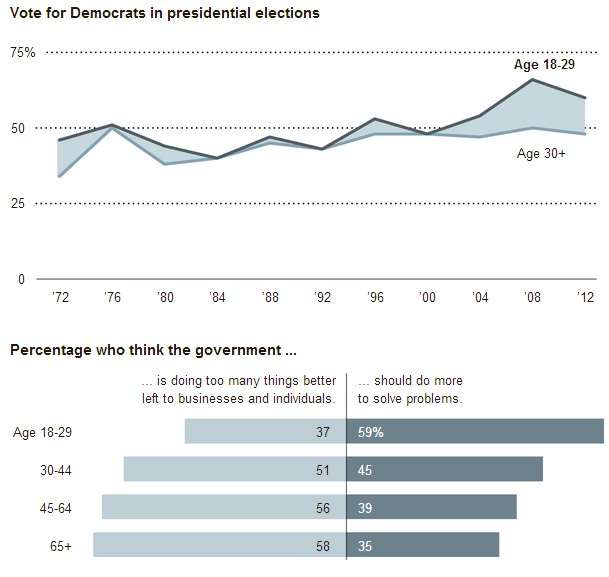
Yet The New York Times reports that not only did 18-to-29-year-olds vote for Obama by far-higher-than-average percentages than folks over 30 years old, they believe that by far-higher-than-average percentages that the government needs to be doing more, not less. This, despite record levels of government spending and debt - and awful results - for the whole of the 21st century.
The paper of record traveled all the way to Montana to rap with a bunch of kids in the college town of Missoula about how fab and gear (is that what the kids say these days?) government really is. The Times needn't have bothered to go all the way to Montana, of course. Because it's the same everywhere:
Under-30 voters are "the only age group in which a majority said the government should do more to fix problems," the nonpartisan Pew Research Center reported in November. In a Pew survey a year earlier, more than 8 in 10 said they believed that Social Security and Medicare had been good for the country, and they were especially supportive of seeing the programs overhauled so they would be intact when they retire.
"This is not a generation of socialists," one young leader tells the Times, but they are far more favorable toward big government, it seems, than previous youth cohorts or most of today's population. Kristen Soltis Andersen, an analyst at the Winston Group tells the Times:
"When you ask young voters what caused the recession, this whole idea that there wasn't enough regulation, or it was George W. Bush's fault, is present," she said. "When conservatives make the argument, 'Hey, the government needs to get out of the way and let you make decisions for yourself,' a lot of young people don't have this idea of the government as a boogeyman. So it makes the conservative message less resonant."
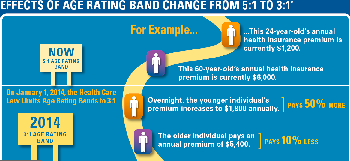
I'd argue that what makes "the conservative message" resonate less among younger people is its, well, conservatism on things such as war, alternative lifestlyes, drug legalization, and immigration. Younger people are less hung up on the sorts of things that really twist conservatives' knickers. And young people then assume that many of the other things that conservatives espouse - such as generally free markets and open trade - are similarly warped. That conservatives are so inconsistent with their basic message - We want smaller government…except when we're talking about immigrants, the gays, and the ability to kill people overseas! - doesn't help matters, either. Most people surely don't prize consistency as much as libertarians do, but the obvious contradictions at the heart of conservative philosophy are off-putting to anyone with the smallest taste for consistency.
Over at Buzzfeed, Ben Smith notes one of the most obvious ways that Obama is tossing young people overboard. Come January 2014, their insurance premiums are going to go up. That's because part of health-care reform stipulates tighter limits on the spread of premiums between older and younger people. Current law holds that insurers on average can't charge insurance premiums for old people that are more than five times what they charge younger people. Under Obamacare, that allowable limit is being squeezed to 3-to-1, the result being that older folks will see dramatic drops in costs and younger people will experience major hikes.
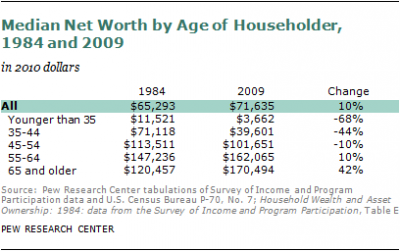
That's just the tip of the iceberg. When it comes to the big old-age entitlement plans and their effects on today's youngsters, there are two points to keep in mind. First off, Social Security and Medicare are massive in cost and they go to all seniors, regardless of demonstrated need. This, despite the fact that they are regularly defended as programs that are the only thing standing between old people and poverty. Yet as a group, households headed by someone over 65 years old are doing far better than households headed by someone under 35 years old.
Second, despite the rhetoric that surrounds Medicare and Social Security, these are not self-funding programs similar to retirement and insurance accounts; individuals don't own them and they can't borrow against them or will them to heirs. Instead, old-age entitlements represent a major transfer from the relatively young and poor to the relatively old and wealthy. The payroll taxes that go into Medicare cover only about one-third of the costs; co-pays and some supplemental premiums bring that total up to around 50 percent of the program's costs. The rest comes out of general tax funds.
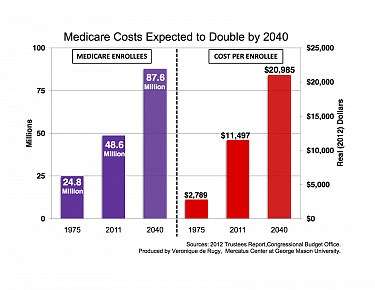
Theoretically, payroll taxes collected over the years are supposed to cover all costs related to Social Security, but in an age where the ratio of workers paying in to beneficiaries taking out is shrinking, those days are numbered (in fact, Social Security no longer can cover current benefits out of current taxes but is drawing down its trust funds). As important, the official government position - upheld by the Supreme Court - is that no citizen has a right to any Social Security benefits. So it's not a pension plan or even a forced savings plan. It's simply a way that the federal government gets money out of workers to give to retirees - even those who don't need it to make ends meet.
Here's another tough chew: Since 2010, the overwhelming majority of people retiring on Social Security will get less money in benefits than they paid in as payroll taxes (this calculation by Urban Institute analysts assumes 2 percent real returns on payroll taxes and 2 percent real increases in benefit values). In other words, the government is forcing most of us to pay into a system that skims 16.4 percent of every dollar of wages up to about $110,000 and will pay us a negative return.
That's the optimistic version, by the way, since there is virtually no scenario under which future benefits will not be cut even as taxes will have to go up to cover those reduced payouts. When various Social Security and Medicare trust funds run dry - and all but the most hard-headed fiscal denialists grant that will happen sometime by 2030 or sooner - they must cut benefits by law. All of that will have an outsized negative effect especially on people just now entering the workforce. They will be paying higher taxes - money they might have used to start saving for their own retirement - for programs that either won't exist at all or will be seriously diminished by the time they start clipping Depends coupons. (For more on this read "Generational Warfare," in the August/September 2012 issue of Reason.)
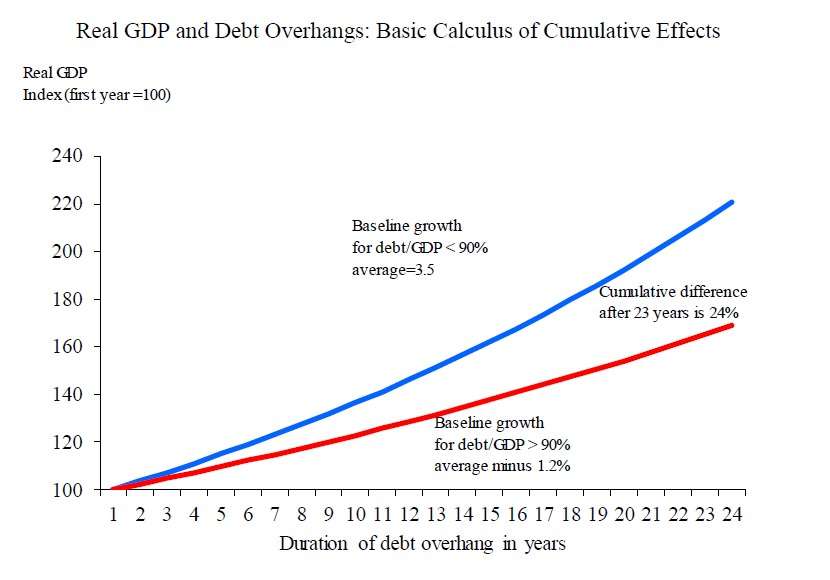
But this sort of thing is relatively easy to fix compared to the real long-term damage that Obama's reckless spending-and-debt binge will almost certainly cause. In a paper released last year, economists Carmen M. Reinhart, Vincent R. Reinhart, and Kenneth Rogoff documented that periods of "debt overhang" - when accumulated gross debt exceeds 90 percent of a country's total economic activity for five or more consecutive years - reduce annual economic growth by more than 1 percentage point for decades. Surveying over two dozen debt overhang episodes, Reinhart, Reinhart, and Rogoff, found that the typical episode of sharply reduced growth lasted 23 years. In other words, kids: You're screwed.
The U.S. economy has been in a debt overhang since the 2008 financial crisis and there's no reason to believe that President Obama is going to do anything soon to reduce the debt-to-GDP ratio. It's fair to say that it's not all his fault. As I never tire of saying, George W. Bush was a big-government disaster, but that can only take you so far. Obama owns the debt every bit as much as he owns the White House for the next four years. And, as the experiences of countries such as Canada and Sweden in recent memory and the United States after World War II attest, there are clear and proven ways to reduce debt-to-GDP and help goose the economy. But because that involves actually changing the status quo and cutting year-over-year spending, Obama is not interested. Indeed, he's even bellyaching about the sequester - which was his idea, by the way. And younger Americans are willing to give him a pass, despite absolutely dismal results under his leadership so far. Does unemployment among 18-to-29 year-olds have to go up to 15 percent (it's already hit 13 percent!) before they get pissed?
The question young people should be asking Obama now is not how much more he might extend their student loan repayments but this: What are you going to do, Mr. President, so that we are not resigned to living in the phantom zone between strong economic growth and sluggish, debt-weakened economic growth?
If you're under 30, look at the chart above and ask yourself whether you'll be lucky enough not to be trapped in that wedge between the blue and red lines? And if you're a parent or grandparent, ask yourself whether your Medicare and Social Security and all the rest is worth consigning your kids to a future of dreams deferred to pay for your benefits. How many of us would prefer to live in a world that's 25 percent poorer than we are right now? Because that's where Obama is leading us.
There's no reason to question The New York Times' finding that folks between 18 and 29 years old are far more likely to believe that government "should do more to solve problems." But until that same group starts recognizing how many problems government is causing - especially for younger people - their future will be far bleaker than they seem to understand.


Show Comments (332)